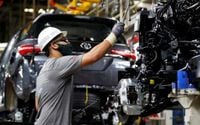The automotive industry in Mexico is facing significant challenges as exports of cars have dropped by 6.04% in the first quarter of 2025, despite a notable increase in production. According to the National Institute of Geography and Statistics (Inegi), Mexico exported 775,866 light vehicles in the first three months of the year, which is almost 50,000 fewer than during the same period in 2024. Meanwhile, the country manufactured 973,485 units, marking an increase of about 44,500 vehicles.
This decline in exports coincides with the implementation of a 25% tariff on all imported cars into the United States, which took effect in late March 2025. The tariffs, imposed by President Donald Trump, have raised concerns within the Mexican automotive sector, the largest industry in the country, which contributes nearly 4% to the national gross domestic product (GDP) and 20.5% of the manufacturing GDP, as reported by the Mexican Automotive Industry Association (AMIA).
During a press conference on April 7, 2025, President Claudia Sheinbaum confirmed that her administration will not immediately retaliate with tariff increases on U.S. imports of steel and aluminum. Instead, she expressed a preference for continuing diplomatic negotiations to secure a better agreement for Mexico. However, she did not rule out the possibility of imposing similar tariffs if necessary.
“We want to avoid reciprocal tariffs as much as possible,” Sheinbaum stated. “Increasing tariffs on those goods would only raise costs in Mexico and adversely affect our national industry.” The president emphasized the importance of dialogue over escalation, particularly in light of the potential for a global recession fueled by trade tensions.
The U.S. remains the primary destination for Mexican light vehicle exports, accounting for 83% of the total, which translates to approximately 643,894 vehicles. In contrast, domestic vehicle sales in Mexico rose by 3.3% year-on-year from January to March 2025, totaling 365,025 units. Despite the overall drop in exports, March saw a 3.83% increase in car exports compared to the same month last year, with a total of 296,964 units exported.
Production figures also showed a positive trend; vehicle production increased by 12.15% year-on-year in March, reaching 338,669 units. National sales also saw a modest increase of 1.27%, totaling 127,360 units sold.
Mexico exports nearly 3 million vehicles to the U.S. annually and supplies 40% of all parts used in the American automotive market, according to the Ministry of Economy. This heavy reliance on the U.S. market places the Mexican automotive industry in a precarious position, particularly with the new tariffs in place.
In light of these developments, Sheinbaum revealed that she is engaging with executives from international automotive companies operating in Mexico to ensure compliance with the rules of origin outlined in the United States-Mexico-Canada Agreement (USMCA). This compliance is critical to avoiding tariffs that could further strain the industry.
Looking back, the automotive sector in Mexico had seen a growth of more than 5% in 2024, marking three consecutive years of growth following the pandemic and supply chain disruptions. However, the recent tariff impositions by the U.S. have raised alarms about the future stability of this vital industry.
As the situation unfolds, the Mexican government is weighing its options carefully, aware that each decision can have significant implications for the economy. Sheinbaum is set to send her Secretary of Economy, Marcelo Ebrard, to Washington this week to continue discussions aimed at securing a favorable outcome for Mexico amidst the ongoing tariff war.
With the stakes high, the future of the automotive industry in Mexico hangs in the balance, as leaders navigate a complex landscape of international trade relations, economic pressures, and domestic industry needs. The outcome of these negotiations could determine not only the fate of the automotive sector but also the broader economic health of Mexico.


